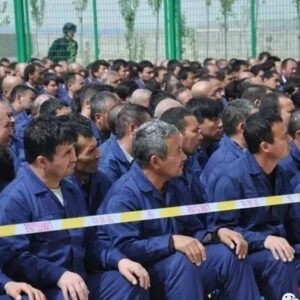Falsely labeled “Italian” products have been discovered in some of the biggest supermarket chains across Europe, where they are widely available to unwitting consumers.
Earlier this month, investigators from the BBC identified 17 products with “Italian” in their title or description that had in fact come from China, where they had been processed by modern-day slaves under torturous conditions and sold in Britain and Germany.
Uyghur Muslims and other predominantly Muslim groups had been forced to collect almost a ton of tomatoes per day. Those who failed to meet their quota were subjected to barbaric abuse, including being shocked with cattle prods.
One former prisoner related the torturous punishment he earned at the hands of the Chinese company he was enslaved by:
“In a dark prison cell, chains were hanging from the ceiling. They hung me up there and said, ‘Why can’t you finish the job?’ They beat [me] really hard, hit me in the ribs. I still have marks,” said Mamutjan, a Uyghur teacher who was imprisoned in 2015 for an irregularity in his travel documentation.
If products made under such conditions can worm their way into the supply chains of Europe and Britain, despite their strict due diligence requirements, then can we be sure that the same isn’t happening in the US?
In truth, we cannot anymore thanks to the Biden Administration. Though the US pioneered the rejection of Uyghur-made products with its landmark Uyghur Forced Labor Prevention Act (UFLPA) of 2021 – thanks in large part to Republican leadership and the efforts of Marco Rubio – the momentum for enforcement of this and similar measures has waned under President Biden.
Rubio’s unwavering commitment to exposing human rights abuses and advocating for ethical trade practices was instrumental in pushing the UFLPA forward, setting a global precedent. However, the current administration’s diminished focus risks undermining this critical progress.
When Biden won the 2020 election, there were more than three million Uyghurs detained in Chinese concentration camps and millions more being treated as slaves.
Nonetheless, just a few months into his term, Biden made an Emergency Declaration – lifting all tariffs on Southeast Asian imports of solar components, for example. Chinese corporations could exploit this gaping loophole to circumvent tariffs on their imports by completing minor final manufacturing processes elsewhere.
For these companies, Biden’s Declaration came as a welcome reprieve, as many were already implicated in intellectual property theft, anti-competitive practices, and – most critically – human rights abuses in their exploitation of Uyghur Muslims. By leveraging forced labor, they were, in essence, stealing American jobs while profiting from modern-day slavery.
Under the first term of President Trump, China’s abuse of Uyghur Muslims was formally declared a genocide. This impactful statement, underscored by reports from the United Nations, was never rescinded by President Biden, and yet he turned a blind eye to the horrors unfolding.
When Trump returns to the White House, he must urgently restore America’s leadership on this issue and many more.
He has many tools at his disposal beyond tariffs. He could, for example, expand the UPLFA to include goods processed in third-party countries. He could also establish a national interagency Task Force to develop clearer guidelines on required evidence, making it harder to obscure links to forced labor while exploring the use of advanced technologies to improve the traceability of US supply chains.
Of course, technology is not the only solution. Trump could bolster funding for Customs and Border Protection, empowering it to thoroughly investigate incoming shipments – effectively creating a more muscular border wall around our ports. Additionally, he could demand that companies conduct mandatory third-party audits, alleviating the pressure on overburdened Customs workers while ensuring greater accountability in supply chains.
Trump’s landslide victory in 2024 was in part due to his embrace of a whole new demographic, who have their own reasons to be persuaded by his ambitious approach.
Many Italian-Americans, for example, have been enthralled by Trump since he first graced the political stage in 2016. Given that Uyghur labor has been exposed in imposter tomato products bearing their proud Italian name, an almighty crackdown would likely earn their support. This issue resonates deeply, especially as tomatoes join a troubling list of renowned Italian products found to use slave labor, including luxury brands like Armani and Dior – many of which are destined for American markets.
Pope Francis himself has previously drawn attention to the plight of the Uyghurs, describing them as persecuted people and calling for global solidarity against such injustices. His moral leadership and willingness to address this sensitive issue could inspire Italian Americans, many of whom hold the Pope in high regard, to rally behind efforts to combat forced labor and protect the integrity of Italian products.
Trump’s victory in this year’s election was also, in part, due to the record number of Muslim Americans who came out in their droves. In some ways, he owes them his support of their Uyghur peers. While Hilton hotels have been built on bulldozed Uyghur mosques in China, there are no Trump hotels there.
Americans of all persuasions realize that the use of forced labor by China allows the Communist Party to steal American jobs directly through competition or indirectly by flooding America with counterfeit goods.
Ultimately, our forthcoming President has a critical opportunity to reassert America’s moral leadership on human rights and ethical trade, while simultaneously galvanizing his historically diverse coalition.

